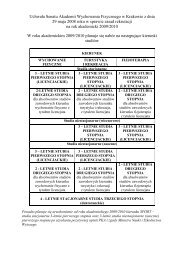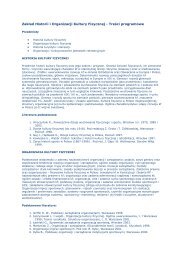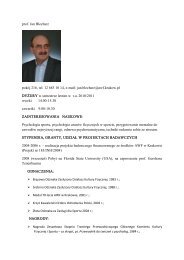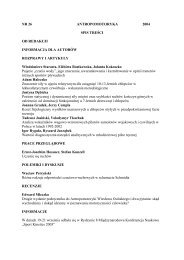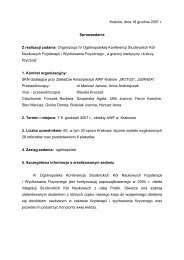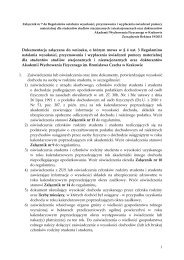Antropomotoryka nr 55.indb - Akademia Wychowania Fizycznego w ...
Antropomotoryka nr 55.indb - Akademia Wychowania Fizycznego w ...
Antropomotoryka nr 55.indb - Akademia Wychowania Fizycznego w ...
You also want an ePaper? Increase the reach of your titles
YUMPU automatically turns print PDFs into web optimized ePapers that Google loves.
Probabilistic prognosis in sport kinetics<br />
and right hand, respectively. After stimulus presentation,<br />
the examinee should touch the left SS with left MS<br />
or the right SS with right MS.<br />
In the third part of experiment the examinee had<br />
one MS in one hand, whereas the SS were placed to the<br />
left and to the right of him/her at the same distance.<br />
The switches arrangement and average reaction<br />
times in particular parts of experiment 5 are shown in<br />
Figure 5. It is to be emphasized that in several cases<br />
the discrepancy between measurements in the third<br />
part of experiment exceeded 400 ms.<br />
The results of all the described experiments show<br />
how important role in speed and economy of motor<br />
reactions falls to probabilistic prognosis and the prepreparing<br />
of musculature – the arrangement to future<br />
actions – which results of it [6].<br />
3. Discussion<br />
A sensorimotor performance, even the most primitive<br />
reflex, is always directed towards future [7, 8], which<br />
includes considerable amount of uncertainty. To overcome<br />
it, it is necessary to use the probabilistic prognosis<br />
to build an appropriate and realizable model of<br />
desired future. In the process of anticipation, a human<br />
adopts intelligence, intuition and instinct.<br />
Intelligence enables construction of successful<br />
action. It needs both knowledge of full information necessary<br />
to solve the task and of all rules of information<br />
processing. Unfortunately, an individual very rarely possesses<br />
such a complete knowledge. So it is necessary<br />
to use intuition to guess the lacking information. The<br />
directions of searching for such lacking information,<br />
concerning both intelligence and intuition, are determined<br />
by instinct [9]. Accordingly, intelligence might<br />
be compared to mathematical interpolation, intuition –<br />
to mathematical extrapolation, and instinct determines<br />
both the ways of task solving (intelligence) and/or lacking<br />
information searching (intuition), respectively.<br />
The intelligence, intuition and instinct determine the<br />
procedure of processed information, but not its modality.<br />
In the Bernstein’s system of information processing<br />
[10, 11, 12, 13], which might be termed “Bernstein’s<br />
ladder” [14], there are five information processing<br />
levels. Each of them has its own code of information<br />
processing (modality), which determine depth and<br />
speed of information processing. In common language,<br />
A-level is responsible for “feeling-in-hand”, B-level – for<br />
movements harmony, C-level – for “measure-by-eye”,<br />
D-level – for common reason, and E-level – for fantasy.<br />
The lower level, the quicker processing, but at the same<br />
time less thorough. Accordingly, intelligence, intuition<br />
and instinct may function at e.g. D-level (verbal code) or<br />
at C-level (visual code). So, different is the intelligence<br />
modality of a mathematician (E and D levels), and the<br />
intelligence of a hunter in Alaska (C level). They have<br />
to process information with various speeds and depths,<br />
so various code modalities are for them of crucial significance.<br />
The teleceptors, specific to C-level, enabled developing<br />
some time consciousness. Its symptom is e.g.<br />
“time-to-contact” phenomenon [15, 16] or timing [17].<br />
The time consciousness makes a basis for probabilistic<br />
prognosis, which enables the specific division of sport<br />
disciplines into three categories:<br />
1. Track and field sports (runs, jumps, throws). The environment<br />
is highly predictable, importance of energetic<br />
factor as compared to mental ones is high,<br />
so importance of probabilistic prognosis is relatively<br />
low.<br />
2. Sport games, combat sports (soccer, fencing, sailing,<br />
basketball, volleyball etc.). The environment is<br />
not predictable, importance of energetic and mental<br />
factors is at similar level. Fully reactive actions<br />
(without prediction) do not guarantee success, so<br />
the function of probabilistic prognosis and energetic<br />
factors are equally high.<br />
3. Intellectual sports (chess, bridge) – importance of<br />
probabilistic prognosis crucial, importance of energetic<br />
factors negligible.<br />
The probabilistic prognosis may concern temporal,<br />
spatial or both the aspects of situation. Extreme temporal<br />
conditions are observed in boxing. For instance, left<br />
jab of Muhammad Ali was about 40 ms. To defend himself,<br />
his opponent would have to recognize the starting<br />
hit, to take decision about counteraction and to perform<br />
it in merely 40 ms. All these processes require at least<br />
200 ms [15], so effective sensorimotor response<br />
would be obviously impossible. Accordingly, the only<br />
possibility to “survive” in such situation is the accurate<br />
probabilistic prognosis, which shifts the moment of reaction<br />
initiation before the left jab starts and enabled<br />
the response completing before the Ali’s left jab lands<br />
on his opponent’s jaw.<br />
Another example is the ski jump. During the in-run<br />
an athlete attains the speed of over 25 m/s. So, if the<br />
length of optimal zone for leap is, say, 0.5 m, then the<br />
jumper has to his disposal merely 0.02 s for taking-off.<br />
Without proper prediction it would be impossible, though<br />
in such a case the scope of uncertainty is limited.<br />
– 21 –


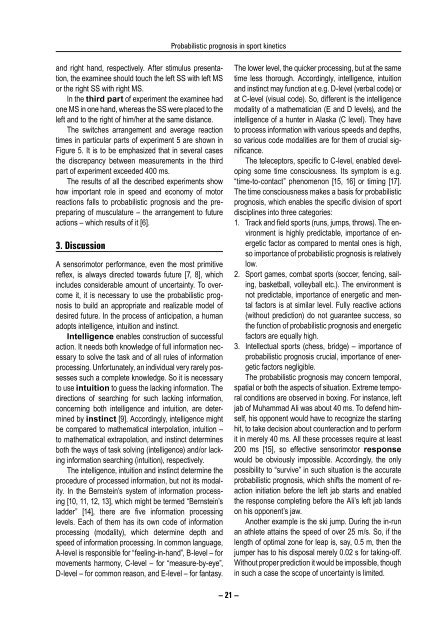


![Antropomotoryka nr 57 [2012]. - Akademia Wychowania Fizycznego ...](https://img.yumpu.com/50213388/1/182x260/antropomotoryka-nr-57-2012-akademia-wychowania-fizycznego-.jpg?quality=85)
